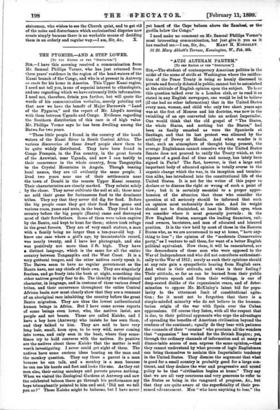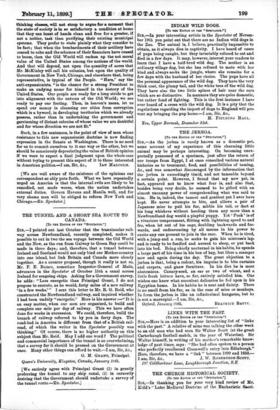"AUDI ALTERAM PARTEM."
[To TEE EDITOR OF TRY "SPECTATOR."] SIR,—The student of contemporary American politics in the midst of the scene of strife at Washington where the ratifica- tion of the Peace Treaty is being so keenly discussed in private and fiercely debated in public, cannot but be astonished at the attitude of English opinion upon the subject. To btar this question talked over in a London club, or to read it as stated in any English newspaper, one would be led to believe (if one had no other information) that in the United States every man, woman, and child who only two short years ago was at the feet of Monroe and his doctrine, was now in the twinkling of an eye converted into an ardent Imperialist. One would think that the old gospel of " The States, the whole States, and nothing but the States," had been as finally smashed as were the Spaniards at Santiago, and that its last protest was silenced by the artillery of Dewey at Manila. And what wonder is it that, such an atmosphere of thought being present, the average Englishman cannot conceive why the United States Senate does not proceed to ratify the Treaty which, at the expense of a good deal of time and money, has lately been signed in Paris? The fact, however, is that a large and important body of educated opinion is totally averse to the organic change which the war, in its inception and termina- tion alike, has introduced into the constitutional life of the United States. It is not for the writer of this paper to declare or to discuss the right or wrong of such a point of view; but it is certainly essential to a proper appre- hension of the situation that those who consider the question at all seriously should be informed that such an opinion most undeniably does exist. And its weight should not be diminished, at least in British eyes, when we consider where it most generally prevails : in. the New England States, amongst the leading financiers, rail- road owners, barristers, and men of educated and leisured position. It is the view held by most of those in the Eastern States who, as we are accustomed to say at home, " have any- thing to lose"; the opinion of the "moderate Conservative party," as I venture to call them, for want of a better English political equivalent. Now these, it will be remembered, are the descendants of those men who were opposed to the War of Independence and who did not contribute enthusiasti- cally to the War of 1812; surely as such their opinions should at any rate gain a sympathetic hearing from English ears. And what is their attitude, and what is their feeling ? Their attitude, so far as can be learned from their public and private speech and from their writings, is one of deep-seated dislike of the expansionist craze, and of deter- mination to oppose Mr. McKinley's latest bid for popu- larity to the uttermost limit of constitutional agita. tion ; for it must not be forgotten that there is a simple-minded minority who do not believe in the humans. tarian origin of the war with Spain over the Cuban oppressions. Of course they listen, with all the respect that is due, to their political opponents who urge the advantages of spreading the benefits of American civilisation beyond the confines of the continent; equally do they bear with patience the counsels of their "cousins" who proclaim all the wonders that " expansion " has worked for the British Empire; yet, through the ordinary channels of information and at many a dinner-table scores of men express the same opinion,—that they cannot understand by what process of logic Englishmen can bring themselves to acclaim this Imperialistic tendency in the United States. They dismiss the argument that what is good for a small country is probably good for a large con- tinent, and they declare the wise and progressive and sound policy to be that "civilisation begins at home." They say that we are all very courteous and very generous to refer to the States as being in the vanguard of progress, &c., but that they are quite aware of the superficiality of their pre- sumed advancement. Men "who have anything to lose," the
thinking classes, will not stoop to argue for a moment that the state of society is in so satisfactory a condition at home that they can boast of hands clean and free for a greater, if not a nobler, task than purifying their existing municipal systems. They prefer to atate plainly what they consider to be fact ; that when the bombardments of their artillery have ceased to echo and the schemes of their financiers have ceased to boom, then the Old World will reckon up the net moral value of the United States among the nations of the world. And that will depend, not upon the quantity of acres that Mr. McKinley will call his colonies, but upon the quality of Government in New York, Chicago, and elsewhere that, being representative, is typical of the People. " Here," say the anti-expansionists, "is the chance for a strong President to make an undying name for himself in the history of the United States. Our people are ready for a long stride to get into alignment with the nations of the Old World; we are ready to pay our footing. Then, in heaven's name, let us spend our money in cleansing our cities from corruption which is a byword, in developing territories which we already possess, rather than in undertaking the government and garrisoning of distant colonies of whose value we are doubtful and for whose direction we are not fit."
Such, in a few sentences, is the point of view of men whose resistance to this new expansionist doctrine is now finding expression in the Senate at Washington. There is no need for us to commit ourselves to it one way or the other, but we should be consciously depreciating the value of British opinion if we were to expect a final judgment upon the whole case without trying to present this aspect of it to those interested in American politics.—I am, Sir, &c., IAN MALCOLM.
[We are well aware of the existence of the opinions our correspondent so ably puts forth. What we have repeatedly urged on America is that the internal evils are likely to he remedied, not made worse, when the nation undertakes external duties. Govern Havana and Manila well, and for very shame men will be obliged to reform New York and Chicago.—ED. Spectator.]







































 Previous page
Previous page